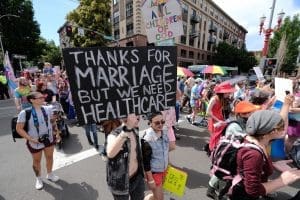Arkansas governor signs bill to let doctors deny care to LGBTQ people
The bill would allow insurance companies, hospitals, pharmacies, and medical practitioners to deny people health care services based on religious, moral, or ethical beliefs.

Arkansas Gov. Asa Hutchinson (R) signed a bill on Friday that would allow insurance companies, hospitals, pharmacies, and medical practitioners, such as physicians and pharmacists, to deny people health care services based on religious, moral, or ethical beliefs.
Those services include patient counseling or psychological therapy, referral, testing, dispensing or administering drugs and medication, record-keeping and notes related to someone’s treatment, performance of a surgery, and more.
If an individual or group files a suit claiming that law was violated, they could receive damages of up to $5,000 for each violation.
The law goes into effect this summer.
“I support this right of conscience so long as emergency care is exempted and conscience objection cannot be used to deny general health service to any class of people. Most importantly, the federal laws that prohibit discrimination on the basis of race, sex, gender, and national origin continue to apply to the delivery of health care services,” Hutchinson stated.
But LGBTQ advocacy groups say that the law would be harmful — regardless of Hutchinson’s insistence — to many queer, transgender and/or nonbinary people seeking health care, particularly during a pandemic.
Sean Cahill, director of health policy research at The Fenway Institute, which focuses on improving health care for LGBTQ people, said laws like this set back patient rights, even if its supporters insist they don’t.
“There’s been a lot of good work happening over the last decade, particularly in our health care system, to do a better job of providing care to LGBT people through things like cultural competency training for clinic staff, collecting and using sexual orientation and gender identity data, and adopting nondiscrimination policies,” Cahill said. “Unfortunately, despite those positive trends, there’s been this kind of rightwing backlash against efforts to increase access to health care for LGBT people.”
Other anti-LGBTQ bills were introduced by Arkansas lawmakers this year. A bill prohibiting transgender girls and women at elementary schools, secondary schools, and colleges from competing on the team of their gender was signed into law on Thursday. Legislation that tells physicians and other health care professionals from providing trans-affirming health care to transgender youth, including hormone treatment and puberty blockers has advanced in the legislature.
Eight bills have been introduced in 2021, in various places across the country, that allow for religious exemptions in health care which could be harmful to LGBTQ people, according to the American Civil Liberties Union.
On March 10, South Dakota Gov. Kristi Noem (R) signed a religious freedom bill that the American Civil Liberties Union of South Dakota said would be used to discriminate against various vulnerable groups in the state. A bill like this one hadn’t been signed since then-Mississippi Gov. Phil Bryant (R) put pen to paper on his own state’s religious freedom law in 2016.
“It’s very important that LGBT people be able to access health care where they live. We live all across rural America. We live in Arkansas,” Cahill said.
He added, “We know that LGBTQI people experience discrimination in society and that it has negative effects on their physical and mental health. But experiencing discrimination … causes people to not seek health care.”
According to a Center for American Progress study released in 2020, 15% of LGBTQ people said they put off or avoided medical treatment because of discrimination. LGBTQ people also said they were experiencing mental health issues because of the COVID-19 pandemic, with 58% saying they “felt little interest or pleasure in doing things for at least several days over a two-week period.”
Cahill said that during a time of economic vulnerability for many LGBTQ people, this law would only further harm their health care access. Data analysis from the Human Rights Campaign and PSB Insight released earlier this month found that 22% of LGBTQ adults were unemployed and 26% of LGBTQ adults had their work hours reduced due to the pandemic.
“Millions of people have lost employer-provided health care as a result of losing their job, and so that’s another added barrier to care. Given that, the last thing we need to be doing as a society is creating additional barriers to care, whether it’s primary care or mental health or substance use counseling,” he said.
The Arkansas governor also signed into effect on Thursday the aforementioned law banning transgender women and girls from playing on the sports teams that correspond with their gender. As NBC News noted, Hutchinson did so against objections from medical groups and child welfare advocates, as well as scores of college athletes.
“This law simply says that female athletes should not have to compete in a sport against a student of the male sex when the sport is designed for women’s competition,” Hutchinson said at the time. “…This will help promote and maintain fairness in women’s sporting events.”
Published with permission of The American Independent Foundation.
Recommended

Missouri governor hopeful Bill Eigel rejects affordable childcare proposal
Eigel has previously supported stripping funds from public schools and once opposed an expansion of early kindergarten.
By Jesse Valentine - April 15, 2024
Montana Gov. Greg Gianforte hosts event with religious extremist
J.P. De Gance is the founder of Communio, an organization that uses social media marketing tools to push a far-right agenda.
By Jesse Valentine - March 27, 2024
Texas Gov. Greg Abbott floats building a wall on the Oklahoma border
It’s not the first time Abbott has engaged in Civil War adjacent rhetoric.
By Jesse Valentine - February 22, 2024






































































